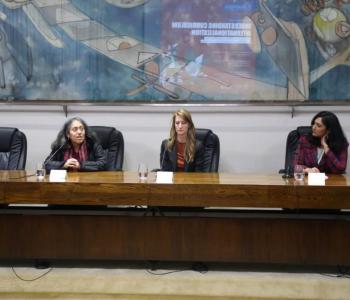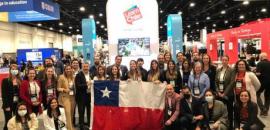Se encuentra usted aquí
Faculty of Engineering is associated with prestigious canadian university to boost the internationalization on students

August 21, 2019
On August 8, the Hall of Honour of the Faculty of Engineering host the successful seminar "Understanding Curriculum Internationalization", an activity led by the Vice Dean for Academic Affairs, PhD Rosa Muñoz, that included the participation of the outstanding academic Ayesha Mushtaq from Dalhousie University, Canada.
The Faculty of Engineering supported this event in order to add an international dimension to the training of engineering students with the "Integrated Learning of Contents and Foreign Languages" methodology, which is aimed to promote global training on students for their international professional career.
The Canadian experience was the starting point for the development of learning methods to address the internationalization of curriculum design at the Faculty of Engineering (FING). Rosa Muñoz points out "together with international experts, we elaborated a curriculum that strengthens the development of skills around internationalization, and also broadens the vision of the content inside the classroom. In addition, we intend to put our students from the first level to the world context by including real engineering problems, and diverse stakeholders and issues with a multidisciplinary approach.”
Results
The achievement of the main objective is based on the development of a set of skills and performances for the student training in a collaborative and comprehensive manner. This considered the formalities of the governance structure, the practical and operative process and the international dimension, contributed by the respective academic.
The Vice Dean argues that a defined curricular structure already exists, and this will allow to not only incorporate concepts of innovation and entrepreneurship, but also, the chance to provide a multidiscipline space. In addition, this redesign considers other possibilities to obtain the professional degree: "we are not only bringing a real-world problem to the university, we are also letting a student develop an internship in an international company. That is part of the degree-obtaining process in order to finish university," explains the authority. Moreover, there is a new regulation for internships, which includes the arrival of students from other nationalities as well.
CLIL Methodology
It is a methodology focused on the comprehensive learning of foreign languages and content, which in the words of Muñoz "it promotes the use of the English language as a further training for global aspects. For example, in engineering we can include aspects of security and market, and skills not only for the local, but also for real-life issues worldwide.
The seminar included two modules, one in English and one in Spanish. An expert panel led by the director of the Department of International and Interuniversity Relations, Anoek van den Berg, developed an analysis of the management, development and experience of internationalization in higher education.
Finally, the Vice Dean of Academic Affairs of the FING positively assess the progress made throughout the process that has been focused on bringing students closer to an international professional future. "We believe that opening the classroom to this type of experience, beyond the disciplinary, is precisely what we need to train engineers with communication, innovation and entrepreneurship skills, and more than anything else, the ability to be an active and useful actor to impact on the world", she concluded.
Translated by Alexandra Cabrera



